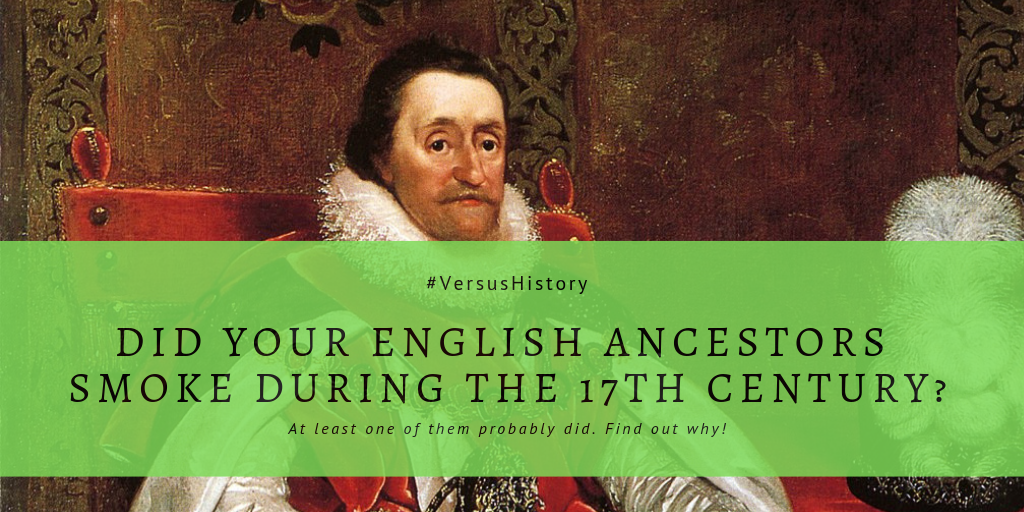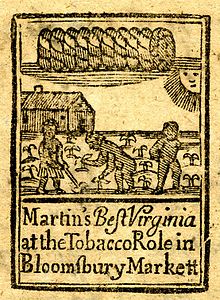...THAT AT LEAST ONE OF YOUR ENGLISH ANCESTORS (PROBABLY) SMOKED IN THE 17TH CENTURY.Smoking tobacco is an addictive, dangerous and expensive habit. It can be potentially ruinous to the health of the smoker and those around them via the vehicle of passive smoking. In the UK, tobacco products cannot be advertised. Nor can they be visibly displayed on the shop floor of your local supermarket or convenience store. Needless to say, due to the ever-increasing public awareness about the negative health implications associated with tobacco smoke (and the relatively high cost of the tobacco products themselves), the number of people who regularly smoke in the UK is in a steady period of decline. However, if you have English ancestry dating back to the 17th century and the Stuart-era, then the chances are that at least one of them smoked tobacco imported from the Americas. Moreover, they may well have believed that tobacco was actually good for them! "In the late 16th- and 17th-century in England tobacco was thought to be a panacea that was universally good for the body." (Jennifer Evans, 2019, History Today) Tobacco was first imported to England during the Tudor period (pre-1603) from the Americas. When Queen Elizabeth I died in 1603, leaving no heir, the Scottish Protestant King James VI, was invited to become King James I of England. His reign witnessed many key historical events: the Gunpowder Plot of 1605 and the journey of the Pilgrim Fathers on the Mayflower to the 'New World' in 1620, to name but two. It also witnessed an exponential growth in the importation of tobacco products from the Americas to feed rising demand. Interestingly, King James actually detested smoking, while simultaneously craving the source of revenue that it raised for the coffers of the Crown: "A custom loathsome to the eye, hateful to the nose, harmful to the brain, dangerous to the lungs, and in the black, stinking fume thereof, nearest resembling the horrible Stygian smoke of the pit that is bottomless." (King James I) Clearly, King James understood the dangers associated with this newly imported habit. When English colonists arrived in Virginia on the east coast of the modern United States of America in the very late 16th and early 17th century, the majority had hoped to 'strike it rich' by finding a bountiful supply of gold and precious metals. When no such find was readily forthcoming, the English colonists slowly but surely switched to tobacco as a source of revenue. The cultivation of the tobacco plant required a vast pool of labour to undertake the grim, repetitive and burdensome work on the plantations. Initially, white indentured labour was used, but this soon gave way to slave labour, with Africans being forced into service under horrific and barbaric conditions. As the number of English smokers during the Stuart-era grew, so the amount of tobacco produced and exported to England rose exponentially to satisfy the rising demand. "By 1670 half the adult male population of England used small pipes made from clay to smoke tobacco on a regular basis." (James Evans, 2018, Why the English Sailed to the New World) Given that in 1570 very few English people would have been exposed to the leaf that emitted the infamous 'stinking fume', this represents a significant growth amongst a population of just over 5 million people by 1650. Therefore, if you have English ancestry dating back to the Stuart-era, it is highly likely that at least one of your forefathers took up the habit of smoking between 1603 and 1714. To take this a step further, you may well have English ancestors that emigrated to the American colonies during this time to participate in the tobacco production process, either directly or by supplying its feeder industries. Approximately 10% of the English population left for the American colonies between 1600 and 1700. While a significant proportion of English migration to the American colonies at this time was fuelled by religious motives, for those such as the family of George Washington the provision of tobacco products to the mother country may have also been a significant financial incentive to make the 3000-mile journey across the Atlantic Ocean.
1 Comment
|
Categories
All
Archives
April 2024
|



 RSS Feed
RSS Feed